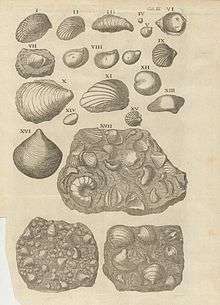Protogaea

Protogaea[1] is a work by Gottfried Leibniz on geology and natural history. Unpublished in his lifetime, it was conceived as a preface to his incomplete history of the House of Brunswick.[2]
Life
Protogaea is a history of the Earth written in conjectural terms; it was composed by Leibniz in the period 1691 to 1693.[3] The text was first published in full in 1749, shortly after Benoît de Maillet's more far-reaching ideas on the origin of the Earth, circulated in manuscript, had been printed.[4]
Views
Protogaea built on, and criticised, the natural philosophy of René Descartes, as expressed in his Principia Philosophiae.[5] Leibniz in the work adopted the Cartesian theory of the Earth as a sun crusted over with sunspots.[2] He relied on the authority of Agostino Scilla writing about fossils to discredit speculations of Athanasius Kircher and Johann Joachim Becher;[6] he had met Scilla in Rome a few years earlier.[7] He took up suggestions of Nicolaus Steno that argued for the forms of fossils being prior to their inclusion in rocks, for stratification, and for the gradual solidification of the Earth.[8]
Notes
- ↑ Full title in German: Protogaea oder Abhandlung von der ersten Gestalt der Erde und den Spuren der Historie in Denkmalen der Natur (Protogaea or Treatise on the First Form of the Earth and the Trail of History in Monuments of Nature).
- 1 2 Nicholas Jolley (1995). The Cambridge Companion to Leibniz. Cambridge University Press. pp. 31–3. ISBN 978-0-521-36769-1. Retrieved 26 February 2013.
- ↑ Gottfried Wilhelm Leibniz (15 September 2008). Protogaea. University of Chicago Press. p. 13. ISBN 978-0-226-11297-8.
- ↑ Michael Allaby (1 January 2009). Earth Science: A Scientific History of the Solid Earth. Infobase Publishing. p. 182. ISBN 978-1-4381-2694-4.
- ↑ Gottfried Wilhelm Leibniz (15 September 2008). Protogaea. University of Chicago Press. p. 20. ISBN 978-0-226-11297-8.
- ↑ Paolo Rossi (15 September 1987). The Dark Abyss of Time: The History of the Earth and the History of Nations from Hooke to Vico. University of Chicago Press. p. 23. ISBN 978-0-226-72832-2.
- ↑ Ofer Gal; Raz Chen-Morris (28 November 2012). Science in the Age of Baroque. Springer Science & Business Media. p. 124. ISBN 978-94-007-4807-1.
- ↑ Gottfried Wilhelm Leibniz (15 September 2008). Protogaea. University of Chicago Press. p. xxv. ISBN 978-0-226-11297-8.
External links
- Protogaea (1749, German), full digital facsimile from Linda Hall Library